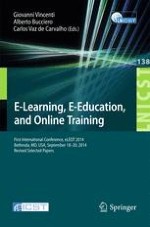2014 | Buch
E-Learning, E-Education, and Online Training
First International Conference, eLEOT 2014, Bethesda, MD, USA, September 18-20, 2014, Revised Selected Papers
herausgegeben von: Giovanni Vincenti, Alberto Bucciero, Carlos Vaz de Carvalho
Verlag: Springer International Publishing
Buchreihe : Lecture Notes of the Institute for Computer Sciences, Social Informatics and Telecommunications Engineering
